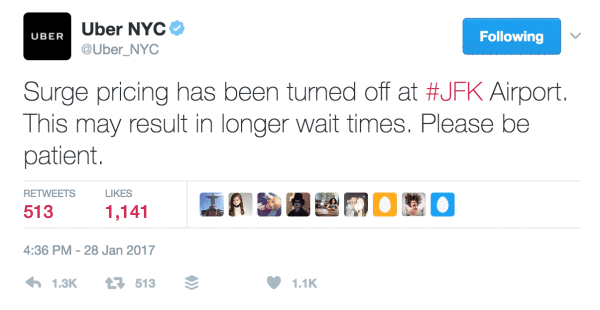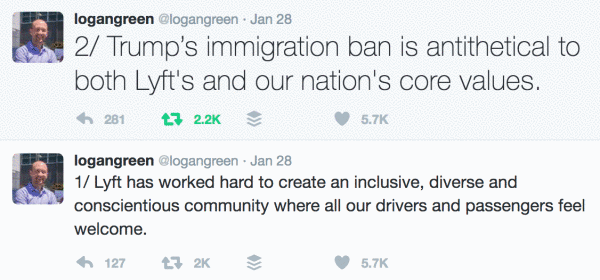
Uber’s social media missteps fueled the recent #boycottUber movement. I find it surprising that a firm a firm itself as a technology company could have such awkward social media strategy.
Context key for #boycottUber
Over the weekend #boycottUber, a hashtag that’s been around for years, blossomed on Twitter after @uber_nyc, the official Twitter account for New York City, announced that it was suspending surge pricing at JFK airport.
What could be wrong with freezing the surge? Uber more often finds itself embroiled in controversy because its surge is too high.
This isn’t the butterfly effect, where one short Tweet sets off a storm. The Tweet about the surge at JFK added to a growing sense of unease with Uber amongst liberals and progressives. This creates a major problem for Uber because the urban centers in which it thrives also tend to be liberal strongholds.
Unease builds after Uber CEO joins Trump council
The #boycottUber movement began to gain momentum after Donald Trump won the election. As part of his transition, President-Elect Trump invited many corporate leaders to serve on his Strategic and Policy Forum on December 14.
Uber CEO Travis Kalanick, famously not one to back down, sought to clarify his position with this declaration, “…[W]e’ll partner with anyone in the world as long they’re about making transportation in cities better…”.
This statement is accurate (Uber has worked with authoritarian Alexander Lukashenko in Belarus since November 2015. It once boasted that Minsk was the fastest growing city in Europe.), but it does nothing to appease liberal fears of Uber aligning with Trump.
Anyone in the world? That’s exactly what progressives fear most.
Trump reveals that all commerce is political
On Friday, January 27, Trump signed a travel ban for seven Muslim countries, fulfilling a campaign promise and stirring up fears.
The cab industry has long been a steady employer of immigrants. It’s dangerous work–a risky mix of strangers and cash. OSHA reports that taxi drivers suffer from a homicide rate at least 21 times as high as other occupations. Taxi drivers, many of whom are from Muslim countries, fear increased anti-immigrant violence.
Taxi drivers supported protests at JFK by refusing to pick up passengers from 6:00 p.m. to 7:00 p.m. And then Uber tweeted that they were suppressing the surge.
Even though the Tweet came over a half-hour past the strike, Uber’s comment fell within the active protest. It quickly was interpreted as an attempt to undermine the taxi drivers.
Social media case study: What’d Uber do wrong?
In this incident, Uber wasn’t responding to a snowstorm, a subway outage or high New Year’s Eve demand. During all these occasions, a suspension of the surge would be welcomed.
The increased demand at JFK resulted from a taxi strike at the airport, a busy entry point for international flights. Taxi drivers refused to pick up passengers in protest of President Trump’s selective Muslim ban.
In this environment, the move to freeze pricing becomes political because it looks like an attempt to undermine the protest, in effect supporting the ban on immigration from select Muslim countries.
By freezing prices Uber looks to be actively courting customers, undermining the strike. Profiteering. Being a scab.
Trump allows progressives finally to see Uber as a scab
I could argue that Uber has always been a scab, a worker that does not take part in a strike. The company’s model takes on drivers as independent contractors. Uber uses a surplus of investor cash to set artificially low prices, at which it can’t make a profit. (This is the first year in several that Uber hasn’t lowered prices in January.) In big cities, this hurts unionized taxi workers.
So, to recap, Uber
- Has a CEO on a Trump advisory board
- Appears to undercut the protest at JFK
For progressive, these two points connect in a line that leads only to corporate evil. Within minutes of the Tweet, #boycottUber began trending.
I find a fair amount of hypocrisy on the part of the finger wagging liberals. What took them so long? Many of the same people would not set foot in a WalMart because of its poor track record on the wages of its employees.
But before these protests how often did they cheerfully step to the curb after exiting a dirt cheap UberX ride–without tipping?
Uber should have seen this coming
I’m sure Uber monitors social media channels for mentions. It should also monitor others in the industry. If it had done so, Uber should have seen this happening.
At 11:56 a.m., the New York Taxi Workers Alliance, a union representing 19,000 drivers, announced that a demonstration was underway at JFK.
HAPPENING NOW AT JFK AIRPORT: Protest at JFK Terminal 4 arrivals area against Trump’s Executive Order banning Muslim REFUGEES & travelers
— NY Taxi Workers (@NYTWA) January 28, 2017
At 5:46 p.m. a tweet addressed to @Uber and @Lyft asked them to join the protest.
anyone know if @Uber or @lyft can pick up at JFK? If so, they should join in this fight. https://t.co/2PE2BBQKPE
— Gregg (@elevationjones) January 28, 2017
This arrived a full two hours before @Uber_NYC’s fateful tweet. Someone should’ve been looking into what’s going on IRL.
The fateful Tweet
And then, it came. At 7:36p.m., @Uber_NYC Tweeted:
Surge pricing has been turned off at #JFK Airport. This may result in longer wait times. Please be patient.
— Uber NYC (@Uber_NYC) January 28, 2017
From the perspective of public relations, suppressing the high surge prices would be the right choice nine-times-out-of-ten. But by failing to take in the global situation, the Uber-Tweeter employed the wrong tool.
Uber had at least two other options. They could have deployed a geofence around JFK, which would have blocked their drivers from accessing trip requests from the airport, or they could have remained silent on the events.
Uber and other ride-hailing companies use geofences all the time. A geofence defines an area on a map, giving it special status. Driver promotions, surge pricing, and queues at airport lots are all run through geofencing. Uber has the tools to turn off pick-ups at JFK, but it chose not to use them.
Lyft, Uber’s main US rival, practiced the other option: silence. Lyft didn’t Tweet about the JFK protests. This leads me to believe that they didn’t deploy a geofence either and that Lyft drivers were able to pick up at JFK throughout the protest. But there wasn’t an electronic missive to react against for the protesters and their supporters.
Reactions speak to the culture at the companies Lyft and Uber.
Lyft, since it didn’t Tweet, didn’t cause a firestorm. It remained silent, except for an announcement that it was donating money to the American Civil Liberties Union. Genius move. Lyft is the laid back, sit-in-the-front version of the larger, more boisterous, more corporate Uber.
Uber made a Facebook post at (curiously) 7:34 p.m., exactly two minutes before the New York office sent the conflagration Tweet. The post clocks in at around 600 words.
This afternoon I sent the email below to Uber employees and thought I would include here:Subject: Standing up for what…
Posted by Travis Kalanick on Saturday, January 28, 2017
In it, Travis Kalanick says that Uber is doing what it can to help employees and drivers affected by the travel ban. He offers to pay drivers (“pro bono”) while they are held up outside the US because of the ban. (I wouldn’t blame a driver for thinking: “How about you pay your active drivers more?”)
He says he thinks it’s vital to have a seat at the table to negotiate those in power.
Lyft’s Tweets address issues directly
Officials at Lyft also crafted a response to the protests, which spread to many airports worldwide. Lyft Co-Founder Logan Green distills his thoughts about the situation to two short Tweets.

1/ Lyft has worked hard to create an inclusive, diverse and conscientious community where all our drivers and passengers feel welcome.
2/ Trump’s immigration ban is antithetical to both Lyft’s and our nation’s core values.
Each Tweet posts at 7:51 p.m., and the official Lyft account immediately re-Tweets them.
Don’t say, “I’m not a crook.”
It took Uber almost five hours to respond to the social media storm their original surge Tweet created. You’d think they would compose a well-crafted missive in that time. Well, they didn’t.
“Last tweet not meant to break strike. Our CEO’s statement opposing travel ban and compensating those impacted: “ And they included a link to Kalanick’s rambling statement the company had posted on Facebook five hours earlier.
By saying “break the strike” Uber puts that concept in people’s minds. It’s similar to when President Richard Nixon got on TV and said, “I am not a crook.” That wasn’t a good look, and he was a crook. Well, apparently Uber’s PR team hasn’t seen the tape of Nixon.
For activists, Lyft looks like a safe harbor, which is only confirmed, when on Sunday morning Green posts a third Tweet announcing that Lyft will donate $1 Million to the ACLU.
Meanwhile, the #boycottUber movement seemed to grow and grow. TechCrunch notes that Lyft has surpassed Uber in iPhone downloads. Comparisons to a Ratner moment, however, might be overstated. Uber remains in the top 20 downloads, only a few places behind.
More troubling for Uber might be the shake in confidence this places in the market as it lurches its way toward what is thought to be an inevitable IPO.
